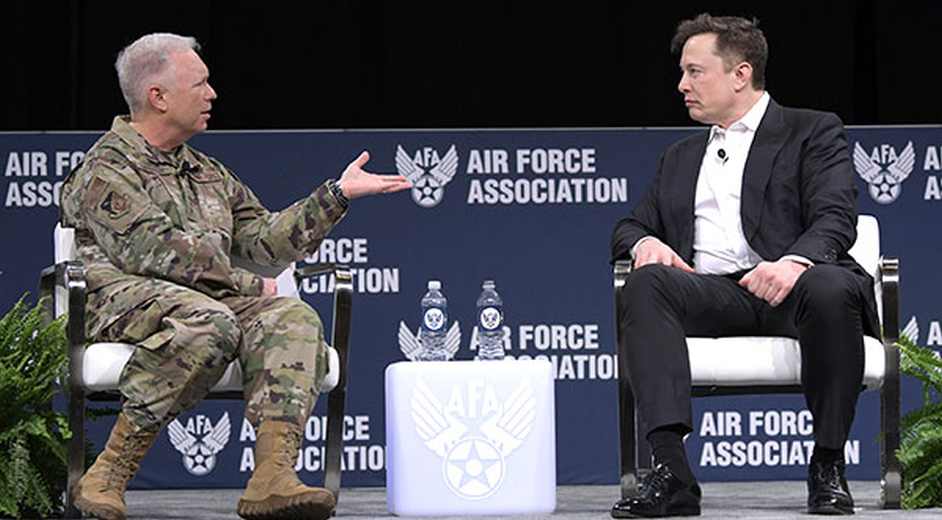Elon Musk warns the US Military: China will overtake the US. “The US will be militarily second to China” without radical innovation, Musk says

Early this year, Elon Musk’s friend and co-founder of PayPal Peter Thiel, warned that big tech companies are too cozy with China. Calling Google a ‘treasonous’ company,” Thiel said the tech giant is working with the Chinese military through its artificial intelligence work with Chinese universities, a charge that Google later denied as “baseless.”
Peter Thiel is not the only person warning about China. Thiel’s friend, Elon Musk, also warned about the danger that China poses to the United States. Musk said that he thinks that if the United States does not use breakthrough innovation. Musk warned the US Military that China will overtake the US unless the United States adopts some radical innovations.
During a fireside chat with U.S. Air Force Lt. Gen. John Thompson at the 2020 Air Warfare Symposium in Orlando, Florida, Musk talked about the competition between China and the USA in terms of the economy and military. Musk predicted that the Chinese economy will eventually surpass the United States by at least two-fold – which would up the ante between the nations’ massive militaries.
Musk explained that “The foundation of war is economics,” Musk said. “If you have half the resources of the counterparty then you better be real innovative, if you’re not innovative, you’re going to lose.”
Answering a question from Lt. Gen. John Thompson about the competition between China and the United States, Musk responded:
“China’s economy is gonna be two to three times the size of the U.S. economy, at least double. Therefore, in order for the U.S. to be competitive on a military level, the innovation has to overcome a gigantic gap in economic output. – Okay. – So in the absence of radical innovation, the U.S. will be militarily second.”
Below is a video of the interview.
Below is part of the transcript from the interview.
“Making electric cars, that would be inconsistent with our mission. So we open-sourced all the patents. – Okay. – In order to help the other, anyone else who wants to make an electric car. So, I guess that’s the opposite of protecting the IP. Now, the real way I think you actually achieve intellectual property protection is by innovating fast enough. If your rate of innovation is high, then you don’t need to worry about protecting the IP because other companies will be copying something
That you did years ago. And that’s fine, you know. Just make sure your rate of innovation is fast. Speed of innovation is what matters. And I do say this to my teams quite a lot. That innovation-per-unit time, it’s like innovation per year if you wanna say it like that is what matters, not innovation absent time. Because if you’re wanting to make, say, a 100% improvement in something, and that took 100 years or one year, that’s radically different. So, it’s like what is your
Rate of innovation? That matters. And is the rate of innovation, is that accelerating or decelerating?
A weird thing happens when companies get big is that, most companies, or organizations, the bigger they get, they tend to get less innovative. Not just less innovative on a per-person basis but less innovative in the absolute. And I think this is probably because the incentive structure is not is not there for innovation. It’s not enough to use words to encourage innovation. The incentive
Structure must be aligned with that. That’s fundamental. So. – So, taking that
a business level to a national level, in terms of, obviously, United States, largest economy in the world, China, the second-largest economy in the world currently and gaining fast, what sort of things could you share with the audience here that are your thoughts on the competition, economic or military, between the United States and China? – Sure. Well, I think China’s a real interesting country, I have
To say. The thing to appreciate about China is just that there’s a lot of really smart, really hard-working people there. And they’re gonna do a lot of great things. This is sort of independent of Chinese government policy, they’re just gonna do a lot of interesting things. The thing that will feel pretty strange is that the Chinese economy is going to be probably at least twice as big as the U.S. economy. Maybe three times, but at least twice. Yeah, so, that assumes a GDP per capita
Still less than the U.S.
But since they have about four or five times the population, then it would only require getting to a GDP per capita of half the United States for their economy to be twice the size of ours. And as I’m sure people in this room know, the foundation of war is economics. And so if you if you have half the resources, of the counterparty, then you better be real innovative. If you’re not innovative, you’re gonna lose. (trumpet music blaring) – I’m not sure
Whether that’s a cyber attack that’s ongoing or not here, so. (string music blaring) (audience laughing) The clock says I have 11 minutes left, is that not true? – I guess it’s moot. – All right, so Smooth Jazz
, – Now the smooth jazz. (audience laughing) – It’s coming through the house system, we’re working to get it shut off. – Thank you. (audience laughing) – Um, yes, well, um, at any rate, (laughs) so with respect to China, China’s economy is gonna be two to three times the size of the U.S. economy, at least double. Therefore, in order for the U.S. to be competitive on a military level, the innovation has to overcome a gigantic gap in economic output. – Okay. – So in the absence of radical innovation, the U.S. will be militarily second. – Okay. – Basic, basic math.”

